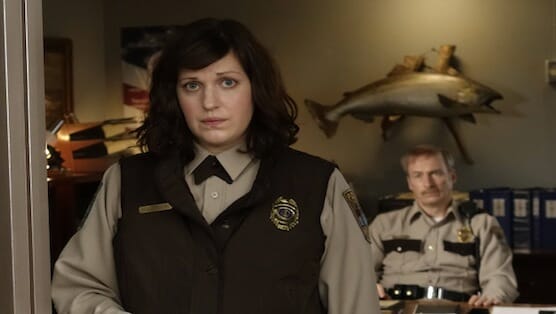Fargo: “Morton’s Fork”

Being the obsessive Coen Brothers fanatic that I am, I feel safe in saying that I, perhaps more than most people, approached the TV adaptation of Fargo with no shortage of apprehension. And while the first episodes made for somewhat of a shaky start, it soon become apparent that this reinterpretation of the filmmakers’ 1996 masterpiece was in very good creative hands.
What Fargo offered was neither glorified fan faction nor a generic crime drama masquerading familiar beats under the guise of its prestigious title; rather, it managed to capture the spirit of Joel and Ethan Coen while simultaneously forging its own path. Whether it was the Walter White-ization of Martin Freeman’s Lester or the Marge Gunderson-ing of Allison Tolman’s Molly, every development managed to feel both surprising and utterly organic.
In showrunner Noah Hawley, the show found not just a phenomenal writer, but someone who knew where to offer his respects to the source material and where to strike out on his own. For Coen Bros. fans, there’s ample Easter Eggs to enjoy, including visual references to the likes of No Country for Old Men, Blood Simple, Barton Fink and The Man Who Wasn’t There (and those are just the ones I could make out). For those seeking merely a good story, however, there was that in spades.
Perhaps the most impressive feat with Noah Hawley’s Fargo, however, was how, despite the show’s ever-expanding canvas, it still managed to keep its focus on the characters and themes that mattered. That being said, it also did a great job of presenting supporting characters as something more than simply a collection of quirks. As cartoonish and broad as Fargo’s characters could get (and, boy, could they be broad), one always got the sense they were still human beings with their unique fears and desires. Last week, we saw this in the form of Linda, Lester’s poor, gullible second wife who he ended up heartlessly employing as a decoy. Prior to her unfortunate demise, the writers provided the character with a brief story about how she used to work in a seedy hotel as a child and would fantasize about a good man coming to take her away. Besides fleshing out the character, the story makes her inevitable death all the more affecting.
But that’s enough naval-gazing. Let’s get to that finale, shall we?
Picking up right where the previous episode left off, we find Lester Nygaard briefly looking over Linda’s body before promptly heading into Lou’s nearby diner to establish his cover story. When the police eventually do pick him up, Lester is prepared with his regular song-and-dance routine. One of the true joys of these ten episodes has been watching Martin Freeman slowly evolve from hapless nice guy to a sociopathic manipulator worthy of his very own cable drama. And though Lester’s lying skills are not nearly as shocking hear as they were in “Who Shaves the Barber?,” it’s still a kick.
Yet, while any decent TV watcher expected good things from the star of The Office and Sherlock, one of the biggest surprises this season has been Allison Tolman ‘s portrayal of Molly. Tolman’s standout moment in this episode comes when she tells Lester the story of a man who lost his glove while getting on a train and ended up tossing the other one out, so that anyone who found the gloves would have the pair. In lesser hands, such a monologue could come across as overly didactic. As delivered by Tolman, it acts as the ideal representation of Molly’s character and values. Furthermore, the fact that Lester cannot even comprehend what he’s being told speaks volumes about how far his morality has been compromised. To hit the point home even further, Lester later offer up an answer to the “Fox/Rabbit/Cabbage” riddle that plagued agent Budge last week. While I don’t pretend to be smart enough to understand the metaphorical implications of the riddle, it does successfully highlight the calculating person Lester has become.
After undergoing questioning, Lester is put under the protection of Budge and Pepper. Unfortunately, the two once again prove themselves to be ineffectual at surveillance and are promptly dispatched by Lorne. Hopefully, in the afterlife, they’re safe to say “bitch” to their heart’s content. Lorne then makes his way into the house, only to find out that Lester— having grown more cunning since their last encounter—has set up a bear trap to ensnare him. Because he’s The Terminator, Lorne manages to slip away, thus leaving Lester free to also escape.
-

-

-

-

-

-

-

-

-

-

-

-

-

-

-

-

-

-

-

-

-

-

-

-

-

-

-

-

-

-

-

-

-

-

-

-

-

-

-

-








































